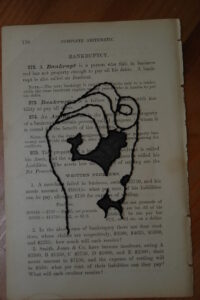When a company runs into financial difficulties leading to receivership or compulsory liquidation, a critical period begins: the suspect period. As we saw in our introductory article on the suspect periodcertain acts carried out during this period are so abnormal that they are automatically annulled by law (nullités de droit). However, other acts, which are quite common and valid in normal times, can also be called into question.
These are known as "optional" nullities. Unlike de jure nullities, which sanction the act itself, these nullities depend on a subjective element: the state of mind of the partner of the company in difficulty at the time of the transaction.. If this partner (creditor, supplier, customer, etc.) knew that the company was in a state of suspension of payments when he dealt with it, the deed may be annulled by the court.. This possibility of annulment is designed to protect equality between creditors and to prevent some, who are better informed, from taking advantage of the situation to the detriment of others. Exploring these situations is essential to understanding the risks incurred by those who continue to do business with a company whose financial situation is deteriorating.
The essential condition: knowledge of the cessation of payments
The linchpin of optional nullities is that the other party to the contract is aware that the debtor is in a state of cessation of payments at the precise time when the disputed act was performed.. Why is this knowledge so crucial? Because it turns a potentially harmless act into a suspicious transaction. Doing business with a company that you know is unable to pay its debts with its available assets may suggest a desire to take advantage of its vulnerability or to secure an undue advantage before collective proceedings are opened..
What exactly do we mean by "knowledge"? It's not just a simple concern or a vague awareness of the company's difficulties.. The courts require actual knowledge of the cessation of payments itself. Mere rumour or even public knowledge of financial problems is not always sufficient to establish such personal knowledge.. The partner must have been given sufficiently clear information to understand that the company could no longer meet its repayments.
This knowledge must exist at the time of the conclusion of the act (for example, the signing of a contract of sale) or its performance (for example, the receipt of payment).. If the partner learns of the cessation of payments only after having dealt with the debtor, the deed cannot, in principle, be annulled on this basis..
The burden of proof lies with the party seeking annulment: generally the administrator, the mandataire judiciaire or the liquidator.. How can this psychological element be proven? Proof can be provided by any means. It will often be necessary to assemble a body of corroborating evidence. For example :
- Repeated payment incidents that were not resolved before the disputed deed.
- Insistent reminder letters and formal notices to no avail.
- Difficult negotiations in which the financial situation was explicitly discussed.
- Precise accounting information communicated to the partner (negative balance sheets, etc.).
- For a banker, reporting an overdraft, repeatedly refusing credit or closely monitoring an account that is no longer operating normally can be indicators.
- For a main supplier, the fact that it has actively sought information about the company's ability to pay from other creditors may be a factor.
However, certain situations alone are not sufficient to prove knowledge. The mere fact that you are a partner in, or even a director of, the co-contracting company does not automatically give rise to a presumption that you are aware that the partner company has ceased payments, even though this may be one indication among others. Judges assess each situation on a case-by-case basis.
Payment of mature debts by normal means
This is undoubtedly the most common case of optional nullity. Under normal circumstances, receiving payment for an invoice that has fallen due is perfectly legitimate. However, if this payment is made during the suspect period and the creditor receiving it knew that the debtor was in a state of suspension of payments, this payment, even if made by the usual means (bank transfer, cashed cheque, cash payment within the legal limits), may be annulled by the court..
The logic is always the same: the informed creditor should not have accepted this payment, which favours him over other creditors who will probably not be paid or will only be paid partially under the collective proceedings.. The nature of the debt paid is irrelevant: it may be the repayment of a loan, the payment of rent, supply invoices, the repayment of a shareholder's current account, or even the payment of wages or social security contributions.. The fact that the claim has subsequently been recognised as a liability in the proceedings does not prevent the cancellation of the earlier payment..
A special situation concerns commercial paper (bills of exchange, promissory notes). In principle, payment of a commercial paper on its due date, even during a suspect period, is not subject to direct cancellation in order to protect the security of currency transactions.. However, the law provides for a specific mechanism: the action en rapport (article L. 632-3 of the French Commercial Code). If the drawer of the bill of exchange (the person who gave the order to pay), or the first endorser of the promissory note (the person who first passed it on), or the beneficiary of the cheque (the person in whose name it is drawn up) was aware of the cessation of payments at the time the instrument was issued or passed on, the administrator or the court-appointed trustee may require them to "report" the sum received by the final bearer.. The action is not brought against the person who received the final payment (the bearer), but against the person who knowingly initiated the transaction.. Proof of knowledge of the cessation of payments is assessed in the same way as for other optional nullities..
Other acts for valuable consideration
Once payments have been made, any transaction concluded for valuable consideration during the suspect period may potentially be cancelled if the other party was aware that payments had been suspended.. An "onerous" transaction is one in which each party receives or is expected to receive consideration from the other. This covers a very wide range of common commercial transactions:
- A sale of equipment or goods (even if the price is right).
- A contract for the provision of services.
- Signing a commercial or professional lease.
- A transaction putting an end to a dispute.
- Creating a guarantee (mortgage, pledge, etc.) for a debt born at the same time the guarantee (unlike guarantees for old debts, which are null and void).
Here again, the transaction itself is not necessarily abnormal. It is the partner's knowledge of the debtor's precarious situation that makes the transaction suspect in the eyes of the law. The court has considerable discretion. It will examine the circumstances of the transaction to determine whether annulment is justified, taking into account the interests involved and the objective of reconstituting the debtor company's assets. Cancellation, if pronounced, will have potentially serious consequences for the co-contractor, as we explain in our article on the procedure and effects of nullities.
Enforcement measures (seizures, etc.)
Before the 2005 Business Safeguard Act, enforcement measures carried out by a creditor during the suspect period (such as a seizure on a bank account) were largely exempt from nullity.. This situation was criticised because it allowed a diligent creditor, who was often informed of the situation, to pay himself "by force" to the detriment of the others, thus breaking equality.
For an in-depth analysis of the impact of insolvency proceedings on specific seizures and securities, particularly as regards the optional nullity of certain enforcement measures, we invite you to consult our dedicated article. The law has corrected this by introducing a specific optional nullity for some of these measures (Article L. 632-2, paragraph 2 of the French Commercial Code). From now on, :
- Attachment: This is a procedure whereby a creditor with a writ of execution can seize the sums owed to his debtor from a third party (often a bank). The seizure deed immediately allocates the sum to the creditor. If the seizure is carried out during the suspect period by a creditor who was aware that the debtor had suspended payments, it may be cancelled.
- Third-party notices (ATD or SATD) : This procedure is similar to attachment for payment, but is mainly reserved for public creditors (Treasury, social security bodies) to recover their debts (taxes, contributions, etc.). It is subject to the same optional cancellation rule if the administration was aware of the cessation of payments at the time it was notified.
- Opposition: This term is more ambiguous. It does not refer to opposition as a remedy. It could refer to certain specific procedures in which a creditor lodges an objection to the payment of a sum by a third party to its debtor, such as an objection to the payment of the sale price of a business (article L. 141-14 of the French Commercial Code) or objections lodged by social security or tax creditors (similar to the ATD). The general idea remains the same: to prevent a measure that would block or divert funds to the benefit of a creditor informed during the suspect period.
Cancellation of all these measures is not automatic. It is left to the discretion of the court, which will have to check whether the pursuing creditor was actually aware of the cessation of payments at the time the measure was taken..
Special case: acts just before the suspect period
The legislator is particularly wary of certain acts that impoverish a company, even if they are carried out when the company is not yet technically in suspension of payments. This is why it has provided for the possibility of optional annulment for two types of acts if they are carried out within the following time limits six months preceding the date that will ultimately be deemed to be the date of cessation of payments (article L. 632-1, II of the French Commercial Code).
These are :
- Free deeds: The same gratuitous acts (donations, etc.) that would automatically be null and void if made for the suspect period may be cancelled on an optional basis if they are made within six months of the date on which they were made. before. The idea is to be able to make up for excessive gifts made shortly before the proven default.
- The notarial declaration of unseizability (DNI) : The possibility for a sole trader to declare that his personal property not used in his business is exempt from seizure is a means of protection. However, if this declaration is made in the six months preceding the cessation of payments, it may also be cancelled by the court. (Note: since the Macron Act of 2015, the principal residence has been exempt from seizure by law, making the DNI less frequent for this specific property).
For these earlier deeds of less than six months, the condition of knowledge of the cessation of payments by the beneficiary (donee or declaring entrepreneur) is logically not required, since by definition the cessation of payments had not yet occurred.. However, the "optional" nature of nullity means that the court retains a margin of appreciation. It will take into account the circumstances: the proximity of the date of cessation of payments, the importance of the act, the apparent good or bad faith of the parties (could the beneficiary have suspected the imminent difficulties?)..
Navigating the intricacies of the nullities of the suspect period requires a careful analysis of the facts and the law. If you have entered into a contract with a company whose failure you fear, or if your own company is experiencing difficulties, anticipation and legal advice are essential.
For a personalised analysis of your situation and the risks associated with the suspect period, our team is at your disposal.
Sources
- French Commercial Code, Article L. 632-1, II
- French Commercial Code, Article L. 632-2
- French Commercial Code, Article L. 632-3




